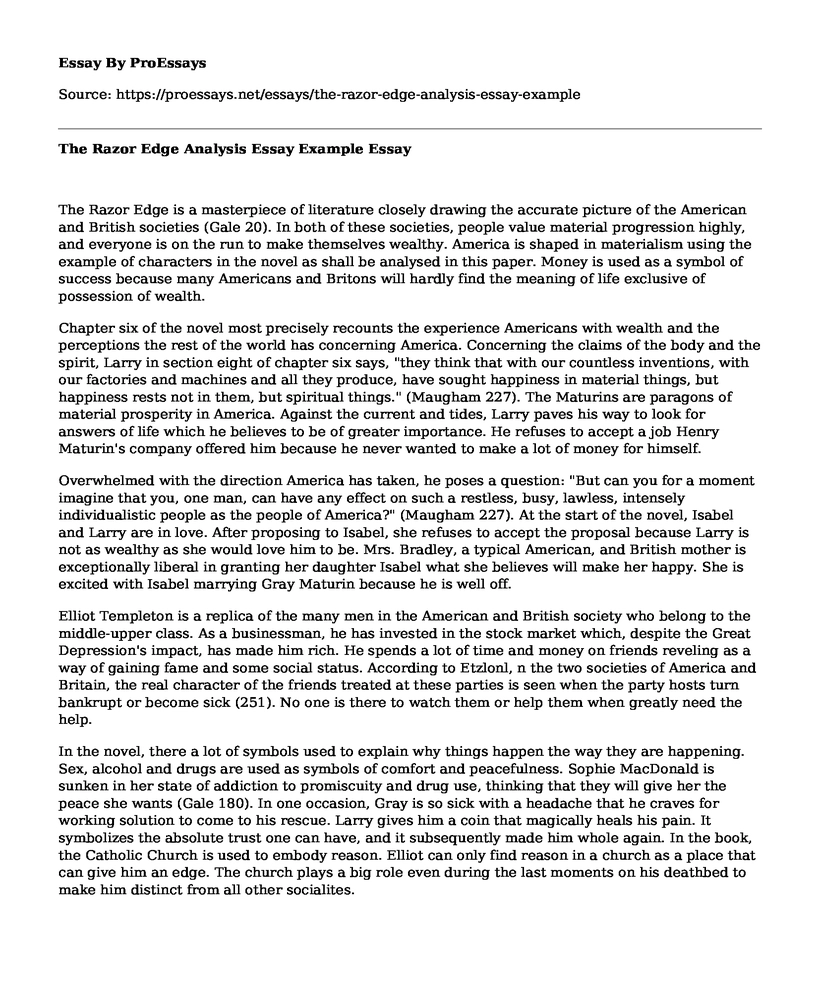The Razor Edge is a masterpiece of literature closely drawing the accurate picture of the American and British societies (Gale 20). In both of these societies, people value material progression highly, and everyone is on the run to make themselves wealthy. America is shaped in materialism using the example of characters in the novel as shall be analysed in this paper. Money is used as a symbol of success because many Americans and Britons will hardly find the meaning of life exclusive of possession of wealth.
Chapter six of the novel most precisely recounts the experience Americans with wealth and the perceptions the rest of the world has concerning America. Concerning the claims of the body and the spirit, Larry in section eight of chapter six says, "they think that with our countless inventions, with our factories and machines and all they produce, have sought happiness in material things, but happiness rests not in them, but spiritual things." (Maugham 227). The Maturins are paragons of material prosperity in America. Against the current and tides, Larry paves his way to look for answers of life which he believes to be of greater importance. He refuses to accept a job Henry Maturin's company offered him because he never wanted to make a lot of money for himself.
Overwhelmed with the direction America has taken, he poses a question: "But can you for a moment imagine that you, one man, can have any effect on such a restless, busy, lawless, intensely individualistic people as the people of America?" (Maugham 227). At the start of the novel, Isabel and Larry are in love. After proposing to Isabel, she refuses to accept the proposal because Larry is not as wealthy as she would love him to be. Mrs. Bradley, a typical American, and British mother is exceptionally liberal in granting her daughter Isabel what she believes will make her happy. She is excited with Isabel marrying Gray Maturin because he is well off.
Elliot Templeton is a replica of the many men in the American and British society who belong to the middle-upper class. As a businessman, he has invested in the stock market which, despite the Great Depression's impact, has made him rich. He spends a lot of time and money on friends reveling as a way of gaining fame and some social status. According to Etzlonl, n the two societies of America and Britain, the real character of the friends treated at these parties is seen when the party hosts turn bankrupt or become sick (251). No one is there to watch them or help them when greatly need the help.
In the novel, there a lot of symbols used to explain why things happen the way they are happening. Sex, alcohol and drugs are used as symbols of comfort and peacefulness. Sophie MacDonald is sunken in her state of addiction to promiscuity and drug use, thinking that they will give her the peace she wants (Gale 180). In one occasion, Gray is so sick with a headache that he craves for working solution to come to his rescue. Larry gives him a coin that magically heals his pain. It symbolizes the absolute trust one can have, and it subsequently made him whole again. In the book, the Catholic Church is used to embody reason. Elliot can only find reason in a church as a place that can give him an edge. The church plays a big role even during the last moments on his deathbed to make him distinct from all other socialites.
Conclusion
Materialism is one thing that can make the human race do everything possible within reach to make one wealthy (Gale 300). In the pursuit of richness, some people are in search of deeper questions of matters affecting human beings. As Larry delved into the Hindu Vedanta to find the meaning of life, many people can find their peace through the spiritual arena. Often material possessions are considered highly in the life of a human being in many societies, yet they cannot provide peace of mind. Somerset excelled greatly in representing the conflict of materialism as far as human happiness and peace are concerned.
Works Cited
ETZlONl, A. M. I. T. A. I. "The socio-economics of work." Meanings of work: Considerations for the twenty-first century (1995): 251.
Gale, Cengage Learning. A Study Guide for W. Somerset Maugham's" The Razor's Edge". Gale, Cengage Learning, 2016.
Maugham, W. Somerset. The razor's edge. McClelland & Stewart, 2016.
Cite this page
The Razor Edge Analysis Essay Example. (2022, Nov 21). Retrieved from https://proessays.net/essays/the-razor-edge-analysis-essay-example
If you are the original author of this essay and no longer wish to have it published on the ProEssays website, please click below to request its removal:
- Essay Sample: Disloyalty in The Great Gatsby and A Doll's House
- "The Yellow Wallpaper": Suppression of Women in 19th Century and Escape
- Essay Sample on Greek Characterization
- The Road Not Taken by Robert Frost Essay Example
- Essay Example on Michael Cunningham's 'Virginia Woolf'
- Essay on Myceneans: Pioneers of Ancient Greece and Language
- American Realism: A Faithful Representation of Reality - Essay Sample







